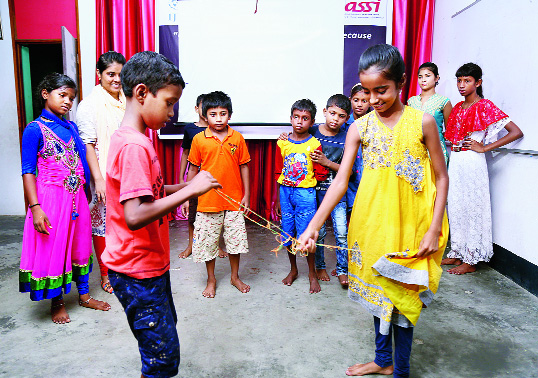A small room near the 12C/2 bus stand in the Dum Dum Park-Kestopur area has helped curb child labour in the area and empowered girls to watch out for child abuse, trafficking and other crimes.
The room, originally a temple storeroom, was turned into a coaching-centre-cum-creche five years ago for local children who would often be left unsupervised all day as their parents went out to earn a living. Social workers started bringing the children of rickshaw-pullers, house help or shop vendors, and engaging them in games, drawing and other activities.
Around 50 children aged three to 17 troop to the room around nine every morning and spend at least four hours there, studying and playing. The older children often help the younger ones with studies in between their own lessons. Tailoring classes are held for older women in the evening.
International Justice Mission (IJM), an organisation involved in rescuing trafficked victims and helping them get justice, has joined hands with local partners Asian Sahyogi Sanstha India (ASSI) to turn the space into a Community Children Welfare Centre and extend its reach to Ultadanga, Kestopur and Dum Dum Park. “Our plan is to train children, adolescent girls and parents here so that they can identify incidents of child abuse and act as police resource during a rescue. Ultimately, the community should support each other without our help,” said Sisir Thanikal, the director of partnerships at IJM Calcutta.
Priyanka Sarkar, 27, has been teaching kids at the centre and helping local residents for over five years and is now ready to go beyond her role. “Early marriage, addiction and dropping out of school are on the rise here,” she said.
Priyanka and other young girls of the neighbourhood are being taught how to add legal knowledge and life-skill training to their regular classes.
Priyanka’s students —Anima Mondal, 11, and Dayal Pramanik, 13 — now know which helpline to dial when in danger and how not to befriend strangers even if they offer chocolates. The older girls are also educated about cyber crime, trafficking and how to create their own network against abuse.
“I get to know from my neighbours if anybody is being abused or married off early. Now I will be able to connect the victims to the right people for help,” said Priyanka, whose father runs a tea shack and mother works as a house help.
IJM also plans to use the space for skill and confidence training for young girls.
“I want to complete college and work in an office,” said Iti Madhu, 20.
“It’s not enough to stop early marriage and abuse. Girls need to be told what opportunities are available,” Thanikal said.











